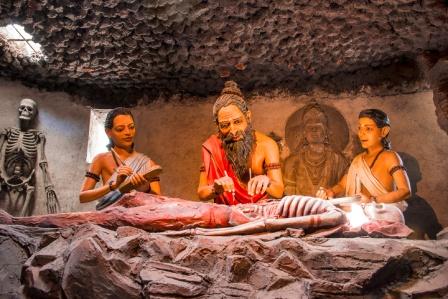This article explains Sushruta Samhita Sutrasthana Chapter 31 “Chaya vipratipatti Adhyaya” – Fatal signs of complexion etc.
Chaya vipratipatti Adhyaya- Fatal signs of complexion- etc.
अथातश्छायाविप्रतिपत्तिमध्यायं व्याख्यास्यामः ||१||
यथोवाच भगवान् धन्वन्तरिः ||२||
Now, we will expound the chapter by name Chaya Vipratipatti – fatal signs are regarding shade / complexion; as revealed by the venerable Dhanvantari.
Read – Lord Dhanwantari ‘The God of Ayurveda’

Chaya prabha rishta
Fatal signs of shade
श्यावा लोहितिका नीला पीतिका वाऽपि मानवम् |
अभिद्रवन्ति यं छायाः स परासुरसंशयम् ||३||
Black, red, blue, or yellow, shades manifesting quickly (without any other cause) in a person, such a man should be considered as going to die, without doubt.
ह्रीरपक्रमते यस्य प्रभास्मृतिधृतिश्रियः |
अकस्माद्यं भजन्ते वा स गतासुरसंशयम् ||४||
He, who loses shyness, lustre, memory ,courage and wealth (and other desires) or who attains these without any reason, both should be considered as going to die, without doubt.
Notes:- Dalhana furnishes details of these terms as follows:-‘Chaya” shade is that which invades varna (colour) and is recognizable from nearness.
- “Prabha” (lustre) is that which illuminates varna (colour) and is recognizable even from a distance.
- Normal colours of the body are four viz. Gaura (white), Krsna (black), Syama (blue, black / brown) and Gaurasyama (whitish blue).
- Chaya (shades) is five viz, Snigdha (unctuous/oily), Vimala (clean, clear), Ruksa (dry, coarse), Malina (dirty, turbid), Sanksipta (condensed, mixed).
- Prabha (lustre) is seven viz. Rakta (red), Pita (yellow), Sita (white), Syava (blue), Harita (green),Pandura (yellowish white) and Asita (black).
- Varna (primary colour), Chaya (different shades of colour) and Prabha (lustre) together form complexion.
Read – Bad Prognosis Of Diseases Based On Dreams and Shadows
Sarira Laksana chesta arista
Fatal signs of features and activities of body parts
यस्याधरौष्ठः पतितः क्षिप्तश्चोर्ध्वं तथोत्तरः |
उभौ वा जाम्बवाभासौ दुर्लभं तस्य जीवितम् ||५||
आरक्ता दशना यस्य श्यावा वा स्युः पतन्ति वा |
खञ्जनप्रतिमा वाऽपि तं गतायुषमादिशेत् ||६||
कृष्णा स्तब्धाऽवलिप्ता वा जिह्वा शूना च यस्य वै |
कर्कशा वा भवेद्यस्य सोऽचिराद्विजहात्यसून् ||७||
कुटिला स्फुटिता वाऽपि शुष्का वा यस्य नासिका |
अवस्फूर्जति मग्ना वा न स जीवति मानवः ||८||
सङ्क्षिप्ते विषमे स्तब्धे रक्ते स्रस्ते च लोचने |
स्यातां वा प्रस्रुते यस्य स गतायुर्नरो ध्रुवम् ||९||
केशाः सीमन्तिनो यस्य सङ्क्षिप्ते विनते भ्रुवौ |
लुण्डन्ति चाक्षिपक्ष्माणि सोऽचिराद्याति मृत्यवे ||१०||
- He, whose lower lips are dropping down and the upper lip lifted up or both lips appearing like a ripe fruit of Jambu (bluish black in colour) then his life is difficult to remain (sure to die).
- He, whose teeth are either red or black or fall off or become like blue in colour like the colour of Khanjana bird (the paste applied to the Mrdanga – musical instrument), should be considered as dead (whose life span has been completed).
- He, whose tongue is black, static (without any movement), coated (furred), swollen or very rough (coarse) – is going to die quickly.
- He, whose nose is irregular, cracked, dry, makes sound (nasal sound) or depressed (gone deep inside) such a person will not live.
- He, whose eyes become constricted, crooked (irregular), stiff (static, no movements), blood red, drops down or outwards or has tearing should be considered to die soon.
- He, whose hairs become parted, whose eyebrows are constricted and drooping down, whose eyelashes are moving constantly (throbbing) / who keeps plucking his eyebrows constantly – such a person is going to die soon.
Read – Charaka Indriya Sthana 7th Chapter Pannaroopiya Indriyam
नाहरत्यन्नमास्यस्थं न धारयति यः शिरः |
एकाग्रदृष्टिर्मूढात्मा सद्यः प्राणान् जहाति सः ||११||
बलवान् दुर्बलो वाऽपि सम्मोहं योऽधिगच्छति |
उत्थाप्यमानो बहुशस्तं पक्वं भिषगादिशेत् ||१२||
उत्तानः सर्वदा शेते पादौ विकुरुते च यः |
विप्रसारणशीलो वा न स जीवति मानवः ||१३||
शीतपादकरोच्छ्वासश्छिन्नोच्छ्वासश्च यो भवेत् |
काकोच्छ्वासश्च यो मर्त्यस्तं धीरः परिवर्जयेत् ||१४||
निद्रा न छिद्यते यस्य यो वा जागर्ति सर्वदा |
मुह्येद्वा वक्तुकामश्च प्रत्याख्येयः स जानता ||१५||
उत्तरौष्ठं च यो लिह्यादुत्कारांश्च करोति यः |
प्रेतैर्वा भाषते सार्धं प्रेतरूपं तमादिशेत् ||१६||
- He who cannot swallow the food present in the mouth, who cannot hold his head straight, whose gaze is fixed at one point, and who has lost consciousness is going to die immediately.
- A person who often becomes unconscious even after being awakened (made conscious) in spite of him being a strong man or a weak man should be understood as ripe for death (i.e., nearing to death).
- The person who lies (sleeps) with his face up (looking up) always, makes vigorous leg movements or is unable to contract his legs will not survive for long.
- The intelligent physician should reject a person whose feet, hands or expiration has become cold, who has interrupted breathing or who breathes like a crow (opening the mouth wide).
- A wise physician should reject (should not treat) a person whose sleep does not get cut in the middle (uninterrupted sleep), or is always awake, or becomes unconscious when desiring to speak.
- The person who sucks or licks his upper lips, and belches often or talks to the pretas (ghost or dead persons) should be considered to have acquired the form of preta (dead).
Read – Arishta Lakshanas – Ominous Signs And Symptoms Indicating Bad Prognosis
Roga Lakshana Arista
खेभ्यः सरोमकूपेभ्यो यस्य रक्तं प्रवर्तते |
पुरुषस्याविषार्तस्य सद्यो जह्यात् स जीवितम् ||१७||
वाताष्ठीला तु हृदये यस्योर्ध्वमनुयायिनी |
रुजान्नविद्वेषकरी स परासुरसंशयम् ||१८||
अनन्योपद्रवकृतः शोफः पादसमुत्थितः |
पुरुषं हन्ति, नारीं तु मुखजो गुह्यजो द्वयम् ||१९||
अतिसारो ज्वरो हिक्का छर्दिः शूनाण्डमेढ्रता |
श्वासिनः कासिनो वाऽपि यस्य तं क्षीणमादिशेत् ||२०||
स्वेदो दाहश्च बलवान् हिक्का श्वासश्च मानवम् |
बलवन्तमपि प्राणैर्वियुञ्जन्ति न संशयः ||२१||
श्यावा जिह्वा भवेद्यस्य सव्यं चाक्षि निमज्जति |
मुखं च जायते पूति यस्य तं परिवर्जयेत् ||२२||
वक्त्रमापूर्यतेऽश्रूणां स्विद्यतश्चरणावुभौ |
चक्षुश्चाकुलतां याति यमराष्ट्रं गमिष्यतः ||२३||
अतिमात्रं लघूनि स्युर्गात्राणि गुरुकाणि वा |
यस्याकस्मात् स विज्ञेयो गन्ता वैवस्वतालयम् ||२४||
पङ्कमत्स्यवसातैलघृतगन्धांश्च ये नराः |
मृष्टगन्धांश्च ये वान्ति गन्तारस्ते यमालयम् ||२५||
यूका ललाटमायान्ति बलिं नाश्नन्ति वायसाः |
येषां चापि रतिर्नास्ति यातारस्ते यमालयम् ||२६||
ज्वरातिसारशोफाः स्युर्यस्यान्योन्यावसादिनः |
प्रक्षीणबलमांसस्य नासौ शक्यश्चिकित्सितम् ||२७||
क्षीणस्य यस्य क्षुत्तृष्णे हृद्यैर्मिष्टैर्हितैस्तथा |
न शाम्यतोऽन्नपानैश्च तस्य मृत्युरुपस्थितः ||२८||
प्रवाहिका शिरःशूलं कोष्ठशूलं च दारुणम् |
पिपासा बलहानिश्च तस्य मृत्युरुपस्थितः ||२९||
- The person in whom blood flows out from the orifices of the body (mouth, nose, ear, eyes, rectum, urethra, vagina) and hair follicles though he is not suffering from poison (in spite of effect of any kind of poison is not there) – such a person is going to die immediately.
- He, whose heart develops pain similar to Asthila of Vata origin (enlargement of prostate), hard like stone – radiating upwards, producing severe pain and aversion to food – such a person is dead (considered to be dead or closer to death) without any doubt.
- Swelling not produced as a complication of any other diseases (i.e., developed independently) commencing from the feet is going to kill the male patient. Similar type of swelling which commences from the face kills the female patient. Similar type of swelling which develops from the genital organs would kill both male and female patients.
- The patient of dyspnoea or cough, who has diarrhoea, fever, hiccup, vomiting, swelling of the scrotum / testes and penis should be considered as losing his life soon.
- Too much of perspiration, burning sensation, powerful hiccup and dyspnoea; these take away the life of even a strong man without any doubt.
- The patient should be rejected (should not treat) a person whose tongue becomes blue black, left eye sinks (goes deep inside) and the mouth emits foul smell.
- He, whose face is filled with profuse tears, both the feet are sweating profusely and eyes become turbid (full of dirt) such a person is going to the kingdom of Yama (Lord of death).
- He, whose body becomes very light or very heavy without any reason, such a person should be understood as one going to the abode of Lord or death.
- The Persons who emit the smell of slush, fish, muscle fat, oil, ghee or even a mixture of smells (smell of mixture of many things) are going to the abode of the God of death.
- Persons in whom lice move about on his forehead, crows do not eat the oblations given by him, who do not find comfort / happiness in anything, they are going to the abode of Yama(death).
- Those who are suffering from fever, diarrhoea and oedema and (dropsy) each complicating with the other, who are very weak in strength and muscles cannot be treated at all.
- The emaciated person, whose hunger and thirst do not subside with pleasant, sweet and healthy foods and drinks, and then death is near to him.
- Death is near to the person who has severe dysentery, headache, and pain in the abdomen, thirst and loss of strength.
Read – Bad Prognosis Based On Premonitory Symptoms Of Disease – Purvarupiya Arishta
विषमेणोपचारेण कर्मभिश्च पुराकृतैः |
अनित्यत्वाच्च जन्तूनां जीवितं निधनं व्रजेत् ||३०||
प्रेता भूताः पिशाचाश्च रक्षांसि विविधानि च |
मरणाभिमुखं नित्यमुपसर्पन्ति मानवम् ||३१||
तानि भेषजवीर्याणि प्रतिघ्नन्ति जिघांसया |
तस्मान्मोघाः क्रियाः सर्वा भवन्त्येव गतायुषाम् ||३२||
Life becomes extinct due to improper administration of treatment, actions of the previous life and non-eternal nature of living beings. Different kinds of Preta, Bhuta, Pissaca, Raksasa etc. always wander near the dying person. Desirous of killing them, they destroy the potency of medicines. Therefore, all kinds of treatments (and medicines) become futile in a dying person.
Thus ends the Thirty first chapter by name Chaya Pratipatti in Sutra Sthana of Sushrutha Samhita.

